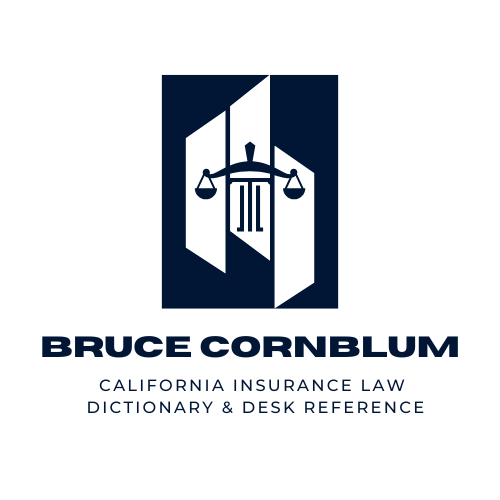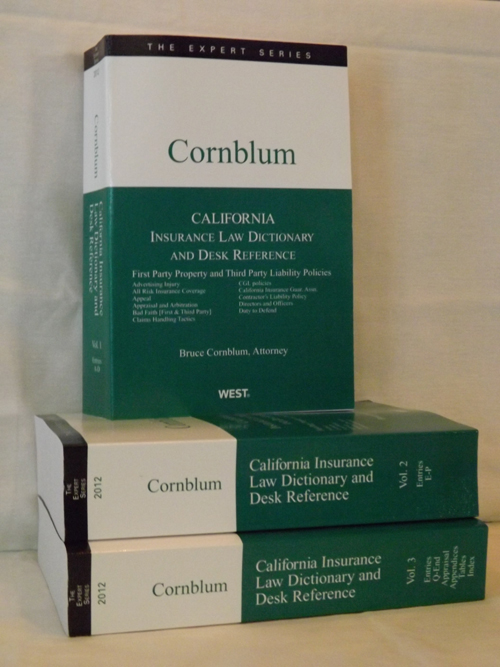A plaintiff’s attorney may want to prove facts obtained from the internet regarding facts contained in the web page of an insurer or facts contained in the web page of a defendant- insureds web page. Other uses may include information used during the punitive damage phase such as net worth information regarding public corporations, or facts and propositions that are of such common knowledge that they cannot reasonably be subject to dispute. The discussion below will be helpful in either proof of such facts or defending against use of such facts obtained from the internet. The information below is contained in the 2011 Edition of CALIFORNIA INSURANCE LAW DICTIONARY AND DESK REFERENCE, 3 Volumes, 4500 pages, available from West Publishing after June 15, 2011.
§ J11 JUDICIAL NOTICE – INTERNET
§ J11:1 In general
Use of evidence obtained from the internet can arise for differing reasons.
a. Requesting a court to take judicial notice of facts contained in an opposing party’s website for purposes of establishing factual admissions of fact. [see Ampex Corp. v. Cargle (2005) 128 Cal.App.4th 1569, 1573-1574, 27 Cal.Rptr.3d 863]
b. Requesting a court to take judicial notice of facts and propositions that are of such common knowledge that they cannot reasonably be subject to dispute. [Evidence Code § 452(g)(g); Truong v. Nugyen (2007) 156 Cal.App.4th 865, 882, 67 Cal.Rptr.3d 675]
The contents of a business posting its Securities & Exchange Commission filings for use in a defamation suit can be the subject of judicial notice. [Ampex Corp. v. Cargle (2005) 128 Cal.App.4th 1569, 1573, 1574, 27 Cal.Rptr.3d 863] Judicial notice that a server [e.g. Yahoo] offers a financial message board for publically traded companies, contents of messages posted on a message board, may be properly judicially noticed. [Ampex Corp. v. Cargle, supra]
Public records may be properly judicially noticed. [U.S. ex rel Dingle v. BioPort Corp. (W.D. Mich. 2003) 270 F.Supp.2d 968, 972]
§ J11:2 Legal basis for requesting judicial notice
Facts and propositions that are of such common knowledge that they cannot be reasonably the subject of dispute can be judicially noticed. [Evidence Code § 452(g)(h); Truong v. Nugyen (2007) 156 Cal.App.4th 865, 882, 67 Cal.Rptr.3d 675 (industry report pertaining to jet skis, magazine article, both not judicially noticed.)] Public records and government documents may be judicially noticed as not being subject to reasonable doubt. [U.S. ex rel Dingle v. BioPort Corp. (W.D. Mich. 2003) 270 F.Supp.2d 968, 672]
§ J11:3 Objections to request for judicial notice relating to facts obtained on the internet
Objections to print-outs containing evidence may be excluded for one or more reasons. The hearsay objection is a valid objection. If the hearsay objection is made by the opposing party, exceptions to the hearsay rule also apply. If the downloaded print-outs are not offered to show the truth of the matter asserted the hearsay objection will not apply. [Evidence Code § 1200, Ampex Corp. v. Cargle (2005) 128 Cal.App.4th 1569, 1573, fn. 2, 27 Cal.Rptr.3d 863]
Authentication may be the basis for an objection. See Evidence Code § 1552. On the subject of authentication, the print-out may be not properly authenticated. However cases have recognized that print-outs can be made from website information, and if so such print-outs give rise to ‘self-authentication’. [Ampex Corp. v. Cargle (2005) 128 Cal.App.4th 1569, 1574, fn. 2, 27 Cal.Rptr.3d 863]
With regards to print-outs from a website, the print-out may not bear the indicia of ‘reliability’ to be admitted. To be authenticated, some fact established by the evidence, perhaps by declaration or affidavit, with knowledge is usually required. [Victaulic Co. v. Tieman (2007, 3rd Cir.) 499 F.3d 227, 236] This is because anyone can purchase an internet address. Absent evidentiary proof as to authentication, such statements of fact prior to discovery or some other means of authentication may be premature. It is premature to assume that a web page is owned by a company merely because its name appears on it. [Victaulic Co. v. Tieman, supra] A company’s website is a marketing tool, often full of imprecise ‘puffery’. [Victaulic Co. v. Tieman, supra]
§ J11:4 Request for judicial notice cannot be made the first time on appeal
A fact requested to be judicially noticed must first be presented to the trial court. Generally, documents and facts that are not presented to the trial court are not part of the record on appeal. [Truong v. Nugyen (2007) 156 Cal.App.4th 865, 882, 67 Cal.Rptr.3d 675]
§ P123:10.7 Gathering evidence to prove financial condition of defendant
Discovery of financial condition of defendant in circumstances not requiring a court order
The purpose behind Civil Code § 3295 is to minimize prejudice prior to the jury’s determination of a prima facie case of liability for punitive damages. [Notrica v. State Compensation Ins. Fund (1999) 70 Cal.App.4th 911, 939, 83 Cal.Rptr.2d 89] Such evidence however is not to be excluded when the information is relevant to liability. [Notrica v. State Compensation Ins. Fund, supra] An example is where the defendant allegedly has converted assets and diverted them from entities in which he has an interest to the individual defendants or to corporations which are the alter ego of the defendant. If the only way a plaintiff can prove his case is to obtain defendant’s financial records, seeking such financial information is proper. [Rawnsley v. Superior Court (1986) 183 Cal.App.3d 86, 91, 227 Cal.Rptr. 806]
Where financial information is available to the public about a defendant’s financial condition, a court order is not required in order to obtain such public information. The Securities and Exchange Commission maintains a website containing financial reports regarding the public companies. (www.sec.gov/edgar.shtml)
Insurance Code § 900 requires every insurer to provide the insurance commissioner with statements exhibits its financial condition and affairs. This information can be found at the California Department of Insurance website (www.insurance.ca.gov) At the trial, records obtained from the website of the insurance commissioner can be introduced by having the court take judicial notice of these records. See § J11 JUDICIAL NOTICE – INTERNET.
Subpoena defendant’s records at the trial
If the court orders discovery pursuant to CCP § 3295(c) or a jury returns a verdict for fraud against a defendant, subpoena of records will be appropriate. Do not limit the records to net worth, gross income, gross assets. Other categories in the subpoena should include a request for credit information, audits and reviews, general ledgers, trial balances, balance sheets, income statement records, rent reports, real property statements, loan and credit applications are examples.
* BOLD references are to Mr. Cornblum’s new 3-Volume legal treatise CALIFORNIA INSURANCE LAW DICTIONARY AND DESK REFERENCE. You may purchase the treatise by clicking here.

